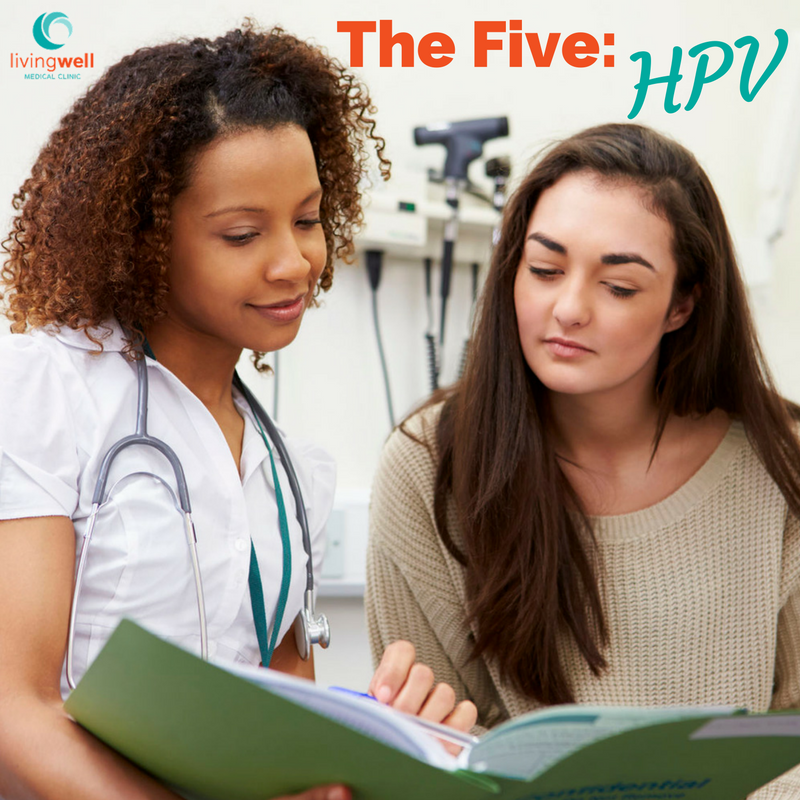The Five – HPV
The Five – HPV

“The Five” is a series of blog posts that will look at some of the most common STIs and give you answers to five of the most important questions you should be asking.
Sexually Transmitted Infections (STIs) are often not talked about because it can be an awkward topic, and when they are discussed, they are frequently misunderstood. For young adults, they are a big problem. The Centers for Disease Control and Prevention (CDC) estimates there are 79 million Americans currently infected with HPV and that about 14 million people become newly infected each year. This makes HPV the most common STI in the US.
Asking the right questions and getting accurate answers is important. Because the more you know, the better you can protect yourself.
The Five – HPV
#1 – What is HPV and how do you get it?
HPV, or Human Papillomavirus, is the most commons STI. It is a viral infection, but it is different than other viral infections such as Herpes or HIV. It is so common that most women and men who are sexually active will get it at some point. There are many different types or strains of the disease, some can cause serious health problems.
As with most STIs, you can get HPV by having oral, vaginal, or anal sex with someone who has the virus. It can pass from one person to another even when no symptoms are present.
You can lower your chances of getting infected by getting vaccinated, taking preventative measures such as using a latex condom the right way each time you have sex (this can lower your chances, but it can also infect areas not covered by a condom, so it will not give you full protection), or by being in a mutually monogamous, long-term relationship.
#2 – What are the symptoms of HPV?
Often those infected with HPV will have no symptoms. Whether you show symptoms can depend on the type of virus you have. Some types of HPV can cause genital warts, some are associated with cervical and other cancers. Many people who get infected will clear it without treatment and have no health problems. The longer the virus is present in the body though, the higher the risk of having health problems.
#3 – How can I find out if I have HPV?
Currently there is no test to find your status, and there are no tests to find HPV in the throat or mouth. There are tests used to screen for HPV related cervical cancer, but these tests are recommended for women aged 30 and over. These screenings are not recommended for men, teens, or women under 30.
Most people who get infected don’t know it and never develop symptoms or health issues. Many find out they have infections when they develop genital warts. Women may also find out when they have an abnormal Pap test result. Others only find out when they have more serious health problems such as cancers.
#4 – Is there a cure for HPV?
There is no cure or treatment for the virus itself. There are treatments for the health problems that HPV can cause. There is a vaccine that can lower your chances of getting infected. The vaccine is recommended for boys and girls ages 11-12. Catch up vaccines are recommended for males through age 21 and females through age 26 if not vaccinated when they were younger.
#5 – What happens if I don’t get tested and treated if I have HPV?
There are no tests to find out if you have HPV and there is no treatment for the virus itself. There are treatments for the health problems it can cause such as genital warts, cervical cancer and other HPV- related cancers, such as cancer of the vulva, vagina, penis or anus.
As we mentioned earlier, young people are a high-risk group when it comes to STIs. Latex condoms and dental dams used the correct way every time you have sex will lower your risk. However, the only sure-fire way to avoid getting any STI is to not have sexual contact (vaginal, oral or anal), until you are in a mutually monogamous relationship with an uninfected partner.
Bottom line, we want you to have all the information you need to make healthy decisions when it comes to sex. You can get more info about HPV from the CDC website.
If you are sexually active and think you might need an appointment for STI testing, we hope to see you. All of our services are confidential and provided at no cost to you. If you have questions about HPV, or our services for other STIs, feel free to leave a message in the comments below.

Neva Monigatti-Lake
Medical Director
The content on this page has been reviewed and approved by our Medical Director.







